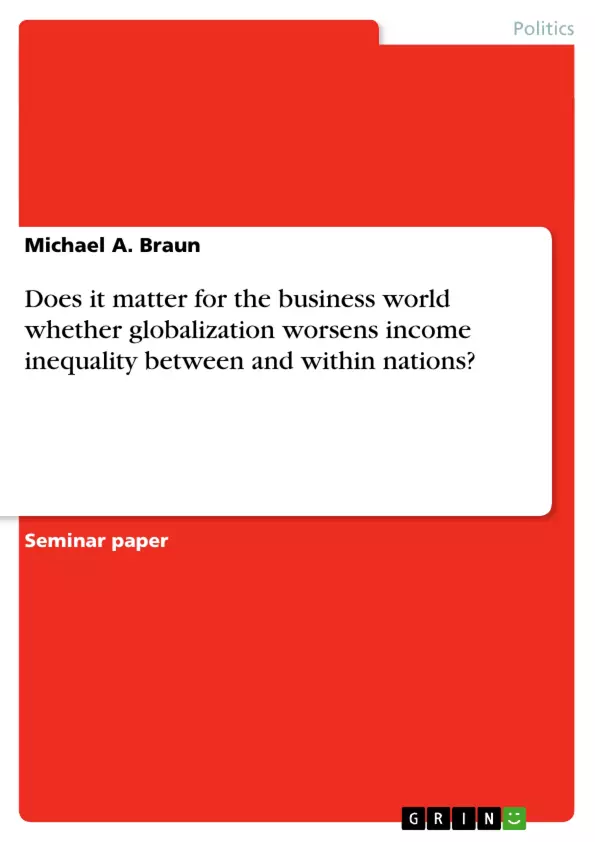The essay’s hypothesis is to suggest, globalization has led to increasing inequality and now matters for the business world. Therefore it describes globalization and income inequality in the context of specific business matters. To discuss and fa-vour – or disfavour – the hypothesis, the author has divided these matters into three consecutive dimensions: the ethical, the political and the economical.
Inhaltsverzeichnis (Table of Contents)
- Introduction and academic method
- Theory of globalization
- What is globalization? Definitions and meanings
- Defining globalization is controversial - Why?
- Historical evolution
- Critics: Anti-globalization
- Supporter: Pro-globalization
- Income inequality
- What is income inequality?
- How can it be measured?
- Inequality between nations ...
- and within nations
- Business matters
- Ethical dimension
- Political dimension
- Economical dimension
- Results and conclusion
Zielsetzung und Themenschwerpunkte (Objectives and Key Themes)
This essay aims to explore the complex relationship between globalization and income inequality, specifically focusing on its impact on the business world. It will examine the various aspects of globalization and its role in exacerbating inequality both between and within nations. The essay also seeks to highlight the ethical, political, and economic dimensions of this phenomenon as it relates to business practices and decision-making.
- Globalization and its impact on income inequality
- The ethical dimension of globalization in relation to business
- The political dimension of globalization in relation to business
- The economic dimension of globalization in relation to business
- The role of business in addressing income inequality
Zusammenfassung der Kapitel (Chapter Summaries)
- Introduction and academic method: This chapter sets the stage by introducing the essay's objectives and providing a brief overview of the key concepts. It emphasizes the controversial nature of the topic and its implications for broader societal issues.
- Theory of globalization: This chapter delves into the definition, historical evolution, and debates surrounding globalization. It examines the perspectives of both critics and supporters of globalization, highlighting the various arguments and concerns.
- Income inequality: This chapter explores the concept of income inequality, its measurement, and its manifestations both between and within nations. It provides a comprehensive understanding of the factors contributing to income inequality and its global impact.
- Business matters: This chapter examines the ethical, political, and economic dimensions of globalization as they relate to business practices. It explores how globalization affects business decisions and their impact on social and economic structures.
Schlüsselwörter (Keywords)
The main keywords and focus topics of this essay include globalization, income inequality, business ethics, political economy, economic development, ethical decision-making, global trade, multinational corporations, and social responsibility.
Frequently Asked Questions
Does globalization increase income inequality?
The essay discusses the controversial hypothesis that globalization exacerbates income inequality both between different nations and within individual countries.
Why should the business world care about inequality?
Inequality affects business in three dimensions: ethically (corporate responsibility), politically (stability of markets), and economically (consumer purchasing power).
What are the arguments of anti-globalization critics?
Critics argue that globalization leads to the exploitation of labor in developing nations and a "race to the bottom" regarding wages and environmental standards.
How is income inequality measured globally?
Common tools include the Gini coefficient and comparing the GDP per capita between developed and developing nations.
What is the ethical dimension of globalization for corporations?
It involves the question of whether multinational corporations have a moral obligation to ensure fair wealth distribution and social standards in the countries where they operate.
- Citation du texte
- Michael A. Braun (Auteur), 2005, Does it matter for the business world whether globalization worsens income inequality between and within nations?, Munich, GRIN Verlag, https://www.grin.com/document/69563



